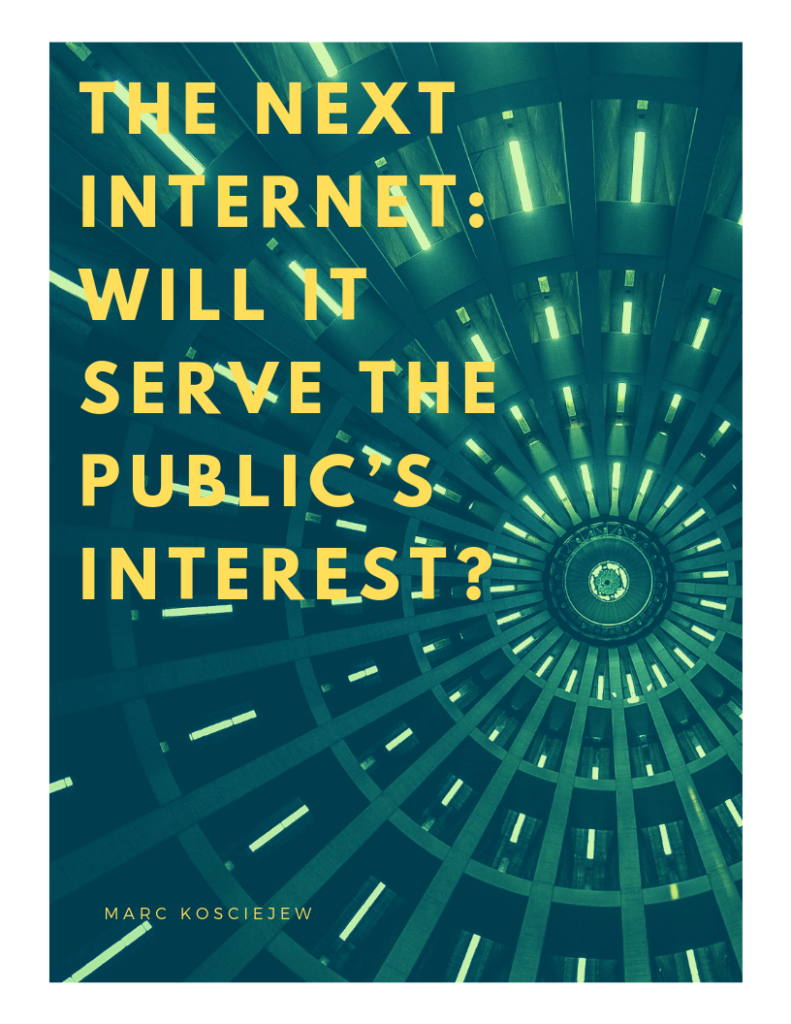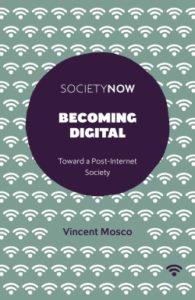The Next Internet: Will it Serve the Public’s Interest?

The Next Internet has arrived. The Internet of previous years has been replaced by a new iteration that is profoundly changing the digital landscape. In Becoming Digital: Toward a Post-Internet Society, Vincent Mosco introduces the Next Internet by analyzing the three pillar technological systems that constitute it, namely cloud computing, big data analytics, and the Internet of things. The central argument is that these three pillar technological systems “comprise an increasingly integrated system that is accelerating the decline of a democratic, decentralized, and open-source Internet.” The Next Internet, instead, is serving corporations’ profit interests and governments’ social control initiatives at the expense, literally and figuratively, of individuals and their personal information.
These converging technological systems represent a new stage in digital development in which an ontological shift is underway insofar as the relationship between humans and digital machines is concerned. The Next Internet has deepened and extended the tendency to experience our lives and wider world through greater technological mediation. While the Internet’s previous iteration required an external device, such as a computer or laptop, to use, log on to, connect, and communicate, “the Next Internet’s digital networks are embedded everywhere, including inside us. They are enabling constant and ubiquitous connections to sensor-equipped objects, and to the scanners worn on, and placed in, our bodies.” The Next Internet significantly expands the virtual realm’s reach and influence over our lives and, in so doing, is helping further our integration with Internet-enabled machines, objects, and other digital technologies.
Title: Becoming Digital: Toward a Post-Internet Society
Author: Vincent Mosco
Publisher: Emerald Publishing Limited
Date: 2017
Length: 248 pages
ISBN: 9781787432963
Price: €23.99
Source: https://books.emeraldinsight.com/page/detail/becoming-digital-vincent-mosco/?k=9781787432963
Understanding the Next Internet requires more than describing these technological systems. It also requires critical reflection upon its diverse implications for our lives and world. Mosco therefore applies a mixed methods approach combining political economy and cultural studies perspectives to the Next Internet. The political economy perspective helps illuminate the power relations shaping the digital landscape. The cultural studies perspective helps make sense of the Next Internet and its promises and perils. Combined, these perspectives offer important insights to better understand the Next Internet’s central features including its three pillar technological systems, the institutions shaping them, the problems it creates and exacerbates, and potential ways in which it could be harnessed for the interests of the public.
The book approaches the Next Internet through six interrelated chapters. The first chapter introduces the Next Internet and how it emerged with the growth of cloud computing, big data analytics, and the Internet of things and through their subsequent convergence. This new iteration of the Internet hastens “the arrival of what might reasonably be called the post-Internet world.”
The second chapter delves into detailed descriptions of the Next Internet’s three pillar technological systems, illuminating the patterns of their development and convergence. Put simply, “the Cloud provides essential storage and processing [of information]; Big Data offers new opportunities for adding value to this stored information; and the Internet of Things collects mountains of data for analysis.” Each contains great technical power that is multiplied through their convergence with one another as well as with objects, people, and nature.
This power is being exploited by corporations and governments, which is explored in depth in the third chapter. The Next Internet’s political economic context and power structure are “represented primarily by the corporations and government institutions that shape the production, distribution, and use of digital technology [and information].” The dominant global tech industry leaders – led by mainly American-based corporations, particularly Apple, Amazon, Facebook, Google, and Microsoft, but also Chinese-based companies such as Alibaba, Baidu, Tencent, Huawei, and Wanda – have monopolized the Next Internet for their profits. Further, these corporate giants share intimate relationships with governments, especially Washington and Beijing, that not only benefit their operations and profits but also enable greater political control over individuals and societies.
These practices of control and commodification are further analyzed in the fourth chapter’s focus on the Next Internet’s penetration into every aspect of people’s lives and social relationships. The Next Internet’s ubiquitous presence and increasingly in everything enables the “measuring and monitoring [of] nearly all aspects of human physical and mental functioning.” It facilitates the tracking and quantifying of an individual’s movements and routines in addition to the performance of one’s bodily organs and functions. This personal data is gathered and stored in the cloud, that is in turn subject to big data analytics to draw conclusions, develop algorithms, and make predictions. A quantified self consequently emerges that is further commodified by corporations for profits and monitored by governments for control.
While the previous chapters gesture to the Next Internet’s many problems, the fifth chapter specifically addresses them. It illuminates the complex political, economic, sociocultural, environmental, and personal vulnerabilities unleashed by growing dependence upon this digital landscape controlled by private corporations, monitored by governments, and driven by commercialization and militarization. The Next Internet’s environmental costs are particularly alarming, posits the author; it is highly polluting and wasteful. For example, its hardware contains toxic substances such as lead, mercury, cadmium, tin, and bromide dioxins. Its continuous operations require enormous energy supplies of electricity, diesel generators, and lead acid batteries. Its contribution to e-waste is staggering with its never-ending cycle of disposal and consumption. Left unchecked, the Next Internet will be a major and constant contributor to environmental degradation.
There is reason for optimism, however, as the Next Internet holds the promise of expanding democracy, personal opportunities, and social equality. Mosco argues that these promises can be realized with more public control over the Next Internet, accompanied by more individual control over our personal data that largely fuels it. He convincingly argues for applying the public utility model to the Next Internet in which it would be treated as an essential resource, much like water and electricity. The Next Internet as a public utility is an alternative to the present status quo of corporate and government control, commodification, and surveillance. It would help enhance democracy, enable universal and equal access to open networks, support public control over systems and platforms, and provide more diverse opportunities to address its many problems. Mosco states that “we now have the technical capacity to achieve these goals. It remains to be seen whether we can build the social movements essential to bringing about a more democratic and egalitarian post-Internet world.”
The convergence of cloud computing, big data analytics, and the Internet of things not only makes up the Next Internet, but also presents serious implications for our Internet-dependent lives and societies. This book serves as a timely response to this major transformation of the digital landscape by providing a critical examination of its technological convergence and implications. It will be of interest not only to information professionals working in diverse information-intensive settings and scholars studying information-related questions, but also to everyone who relies on the Internet for professional and personal purposes.
Presently, the Next Internet is establishing global networks of unprecedented power that are enlarging the commodification, militarization, automation, and surveillance of the world. These perils are compounded by the monopolistic control of the Next Internet by a handful of powerful information technology corporations and their close connections with governments and security services. These perils, however, are not inevitable outcomes. With carefully considered political and public-minded policy interventions, the Next Internet can be harnessed to expand democracy, empower individuals, provide greater life opportunities, and advance social equality. As a public utility, the Next Internet promises to serve the public interest.
Photo by Francesco Ungaro from Pexels

Download the PDF version of the article.
[ls_content_block id=”896″]
[ls_content_block id=”726″]
About the Author

- Dr. Marc Kosciejew is a Lecturer and former Head of Department of Library, Information, and Archive Sciences at the University of Malta. He has been published in scholarly and professional journals, lectured in Europe and North America, and presented worldwide from Canada to China at diverse universities, institutions, and events from MIT to the National Archives of Sweden to Malta’s National Book Festival. He is also the winner of ARMA International’s prestigious Britt Literary Award for 2014 for his article on personal data rights.


